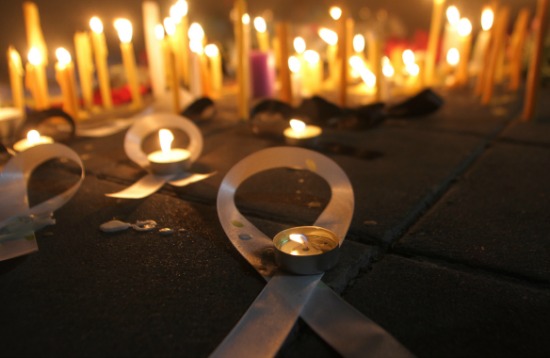Like most people on the East Coast, I got the first news in the blur of waking on Sunday morning. I checked my email for an overnight report about an ailing family member in Dallas. What I got instead was “Orlando,” as we are learning to call the massacre. Another name is added to the apparently endless litany.
No matter how many times the country goes through this, I fumble my response. First, I am taken unaware. Surprise is an ingredient in these horrors. I know that I am supposed to feel next some new resolve. After all, we have been through this before—too many times. There are things to be done: candlelight protests, funds for the victims (or their families), declarations of solidarity or identification. Hashtags and logos. Ready-made political arguments. But I am never ready to move on. Instead of calculating at once what the latest crime implies about failures in policy or policing, what it foretells for the electorate or the national character, I want a day—a week, a month—to weep.
Earlier attacks have had this effect on me. When the bulletins arrived about the shooting of writers and artists at Charlie Hebdo, it was as if killers stalked into the room where I write, violating its intimacy. When the bloody news arrived from Charleston about the slaughter at Mother Emmanuel, I felt with so many others the shock of desecration. Cut down at a Bible study in that church, that haven, that stubborn testimony of impossible hope.
Now Orlando. Can you understand how an attack on an LGBT club during Pride might also feel like a domestic violation and even a desecration? These clubs have been our town squares and community centers when no other places would let us meet. They offered a chance to improvise new family when “real” families slammed the doors. (That is why the clubs once made a point of being open around Thanksgiving.) Most of all, they held open a place to celebrate what so many others condemned. That is why these clubs have been for decades the targets of violent attack—by the police or roving gangs or the arrogantly pious. The massacre in Orlando recalls a history of other attacks. It makes clear why Pride parades memorialize what happened after a raid on the New York bar called Stonewall.
However dubious or improbable it may seem, “queer” clubs have been and still are important ritual spaces. There are others, of course, like the churches or temples that have long welcomed sexual outcasts who were trying to keep some connection to the sacred. Cities offer LGBT sanghas and ashrams, pub churches, and weekly spiritual gatherings. The countryside hosts the splendid utopian encampments of music festivals and faerie circles. Still, much of the ritual of making new sexual selves takes place around dance floors.
Growing up queer in a straight society often requires strict bodily control. To pass as straight, we have to watch how we dress or walk or cut our hair or move our hands. The eyes can give away the secret. So too can the sway of hips. Dancing is particularly risky, not least because it is supposed to rehearse the approved gender relations. (Not so many decades back, a woman dancing with a woman at certain clubs, or a man with a man, might be subject to arrest.) So imagine what it feels like to step for the first time into a space where you can move freely—where you can dance your desire with the one you desire.
I never danced at Pulse in Orlando, though I have danced at other Pulses in other cities. I’m sure that on Saturday night, in that ritual space, the usual congregants gathered. There were the star dancers, the ones who knew the floor’s textures and who could anticipate the scintillating changes of rhythm that would mark a Latin Night. There were doubtless straight women who came to dance where they felt safe. Old-timers who mostly watched, passing admiring or acerbic comments to friends (the equivalent of whispering in the pews). At least one person, I’m sure, fairly new to the clubs or to la onda, a little nervous, maybe bruised by harsh judgments at home or in church—there was someone at Pulse on Saturday night who stepped onto the dance floor in astonished relief at being free to move.
Let me stay beside that dance floor a while longer. I don’t doubt that the country needs a rational gun policy or that this presidential campaign calls out for reminders that demagoguery has real consequences. But I can’t yet move past the bodies of these dead and wounded to propose policies or tout candidates.
Lamentation is a forgotten rite deep in our religious traditions. It is often associated with repentance. In the old language of the Episcopal Book of Common Prayer, we are taught to “acknowledge and bewail our manifold sins and wickedness.” We could certainly benefit from a little national repentance. But we need even more to kneel down beside the reality of the mounting losses. The politics we most require in the wake of Orlando is a politics of tears shed over what we have destroyed and can never ourselves restore. The civil politics of religious lamentation: No hashtag can do this for us.
Mark D. Jordan is the Andrew W. Mellon Professor of Christian Thought at Harvard Divinity School and Professor of Studies of Women, Gender, and Sexuality at Harvard. He is the author of numerous books on sexual ethics, including Recruiting Young Love: How Christians Talk about Homosexuality and Convulsing Bodies: Religion and Resistance in Foucault.
